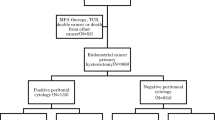Abstract
Introduction
The prognostic significance of positive peritoneal cytology (PPC) in patients with early-stage endometrial cancer (Stage I/II) was disregarded by FIGO in 2009 classification, though FIGO recommends to collect peritoneal washings for cytology in all patients of endometrial carcinoma.
Objective
To find out the association between positive peritoneal cytology and other prognostic factors of early-stage endometrial cancer and the influence of positive peritoneal cytology on survival of these patients.
Primary objective—Association of positive peritoneal cytology with overall survival (OS) and disease-free survival (DFS).
Secondary objective—Association of positive peritoneal cytology with other prognostic factors of early-stage endometrial cancer.
Methods
Data were collected retrospectively from department of Gynecological oncology, Acharya Harihar Regional Cancer Center, Cuttack, India, between July 2009 and December 2017. Patients with stage I/II endometrial cancer who had undergone complete surgical staging procedure including pelvic lymphadenectomy were included. Comparison of pathological characteristics in patients with or without malignant cells in peritoneal cytology was done using univariate and multivariate analysis followed by survival analysis using Kaplan–Meier curves in these two groups, and the difference in survival was obtained by the log-rank test.
Results
Out of total 192 patients, 29 (15.1%) had positive peritoneal cytology. Among patients with positive peritoneal cytology, 27.6% patients had non-endometrioid histology like clear cell carcinoma and serous carcinoma of endometrium (P = 0.001). Similarly, 44.8% patients had Grade 3 histology, 51.7% patients had more than 50% myoinvasion, 48.3% patients had positive LVSI (lymphovascular space invasion) and 17.2% patients had stage II disease. Patients with positive peritoneal cytology had 17 months of lower disease-free survival (P < 0.0001) and 16 months of lower overall survival (P < 0.0004) compared to patients with negative peritoneal cytology. In multivariate analysis, positive peritoneal fluid cytology remained an independent prognostic factor for both disease-free survival (DFS) and overall survival (OS).
Conclusion
Our study suggests that positive peritoneal cytology may be a potential prognostic factor in early-stage endometrial cancer owing to its significant association with other prognostic factors and its significant influence on both DFS (disease-free survival) and OS (overall survival).


Similar content being viewed by others
References
Mehasseb MK, Latimer JA. Controversies in the management of endometrial carcinoma: an update. Obstet Gynecol Int. 2012;2012:676032.
Shiozaki T, Tabata T, Yamada T, Yamamoto Y, Yamawaki T, Ikeda T. Does positive peritoneal cytology not affect the prognosis for stage I uterine endometrial cancer? The remaining controversy and review of the literature. Int J Gynecol Cancer. 2014;24:549–55.
Del Carmen MG. Positive peritoneal cytology in patients with endometrial cancer: continued controversy despite shift in staging. Cancer Cytopathol. 2014;122:315–6.
Fadare O, Mariappan MR, Hileeto D, Wang S, McAlpine JN, Rimm DL. Upstaging based solely on positive peritoneal washing does not affect outcome in endometrial cancer. Mod Pathol. 2005;18:673–80.
Takeshima N, Nishida H, Tabata T, Hirai Y, Hasumi K. Positive peritoneal cytology in endometrial cancer: enhancement of other prognostic indicators. Gynecol Oncol. 2001;82:470–3.
Mariani A, Webb MJ, Keeney GL, et al. Assessment of prognostic factors in stage IIIA endometrial cancer. Gynecol Oncol. 2002;86:38–44.
Saga Y, Imai M, Jobo T, et al. Is peritoneal cytology a prognostic factor of endometrial cancer confined to the uterus? Gynecol Oncol. 2006;103:277–80.
Havrilesky LJ, Cragun JM, Calingaert B, Alvarez Secord A, Valea FA, Clarke-Pearson DL, et al. The prognostic significance of positive peritoneal cytology and adnexal/serosal metastasis in stage IIIA endometrial cancer. Gynecol Oncol. 2007;104(2):401–5.
Cooke EW, Pappas L, Gaffney DK. Does the revised International Federation of Gynecology and Obstetrics staging system for endometrial cancer lead to increased discrimination in patient outcomes? Cancer. 2011;117:4231–7.
Lurain JR. The significance of positive peritoneal cytology in endometrial cancer. Gynecol Oncol. 1992;46(2):143–4.
Garg G, Gao F, Wright JD, Hagemann AR, Mutch DG, Powell MA. Positive peritoneal cytology is an independent risk-factor in early stage endometrial cancer. Gynecol Oncol. 2013;128(1):77–82. https://doi.org/10.1016/j.ygyno.2012.09.026.
Lee B, Suh DH, Kim K, No JH, Kim YB. Influence of positive peritoneal cytology on prognostic factors and survival in early-stage endometrial cancer: a systematic review and meta-analysis. Japanese J Clinical Oncol. 2016;46(8):711–7.
Seagle B-LL, Alexander AL, Lantsman T, et al. Prognosis and treatment of positive peritoneal cytology in early endometrial cancer: matched cohort analyses from the National Cancer Database. Am J Obstet Gynecol. 2018;218:329.e1-315 e15.
Funding
Not applicable.
Author information
Authors and Affiliations
Contributions
AKP was a principal investigator; MRM is a co-principal investigator; JM performed manuscript writing, editing, data collection; SR was involved in statistical analysis; JM collected the data and edited the manuscript, BLN contributed to statistical analysis and manuscript editing, JP was involved in supervision and guidance; SKG is a supervisor and manuscript scrutinizer.
Corresponding author
Ethics declarations
Conflict of interest
The authors declared that they have no conflict of interest.
Ethics Approval
The ethical approval was obtained by Institutional Ethics Committee AHRCC, Cuttack, Regd no. – ECR/297/Inst/OR/2013/RR19.
Additional information
Publisher's Note
Springer Nature remains neutral with regard to jurisdictional claims in published maps and institutional affiliations.
Rights and permissions
About this article
Cite this article
Padhy, A.K., Manoranjan, M., Jagannath, M. et al. Is Peritoneal Cytology an Independent Prognostic Factor in Early-Stage Endometrial Cancer?. Indian J Gynecol Oncolog 19, 34 (2021). https://doi.org/10.1007/s40944-021-00508-w
Received:
Revised:
Accepted:
Published:
DOI: https://doi.org/10.1007/s40944-021-00508-w




